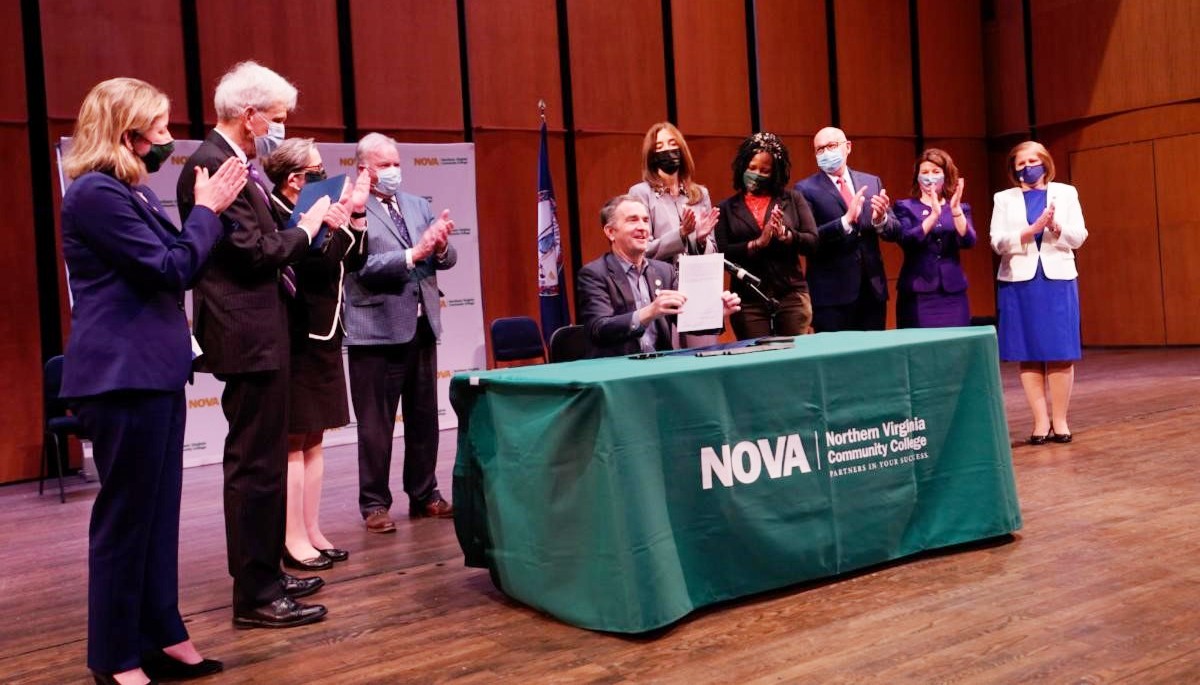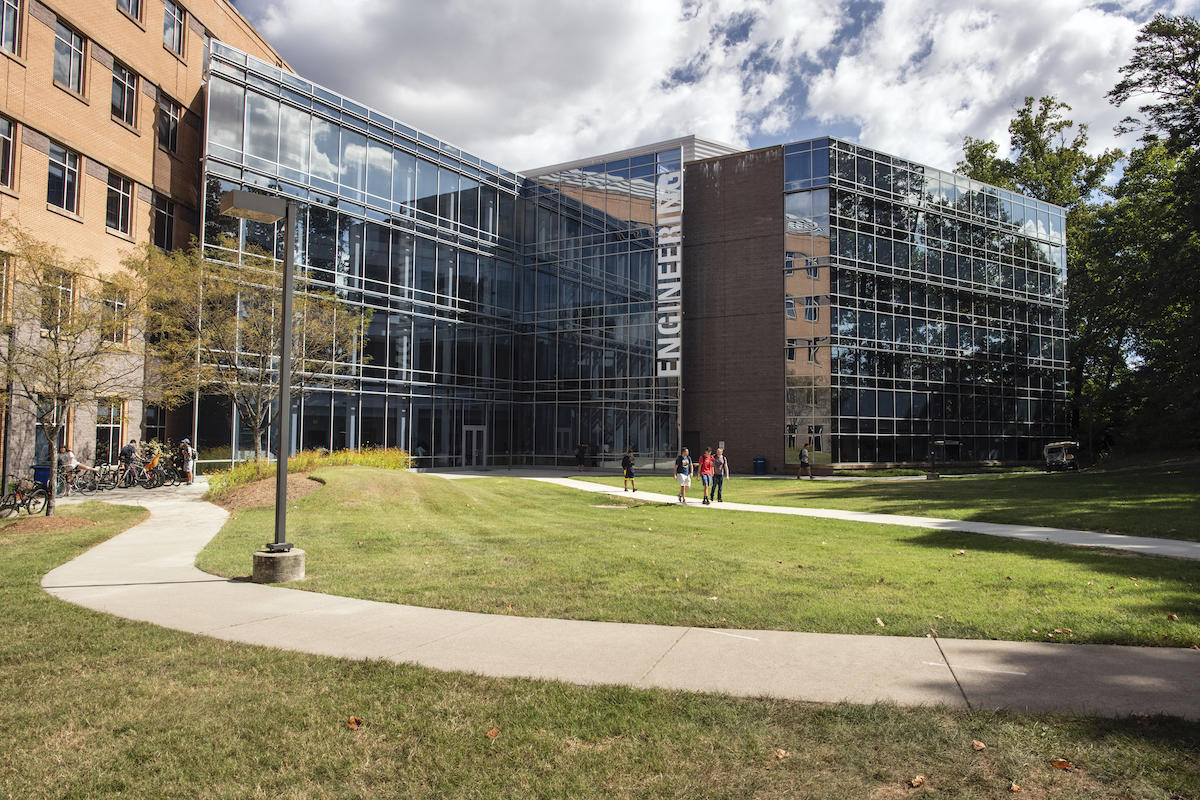E-Newsletter
Tuition-free community college program coming for students in IT, other high-growth fields

Gov. Ralph Northam signs the G3 initiative at Northern Virginia Community College’s Alexandria campus. (Photo courtesy of the office of Governor Northam)
Tuition-free community college is now available in Virginia for low- and middle-income students who pursue education in specific high-demand career fields including information technology and computer science.
Visiting Northern Virginia on Tuesday, Gov. Ralph Northam signed legislation to create the “Get Skilled, Get a Job, Give Back” initiative, or “G3” program, which includes $36 million to cover tuition, fees, and books and provide other support for eligible students at the Commonwealth’s two-year public institutions.
In addition to education for IT and computer science fields, the initiative targets industries including health care, manufacturing and skilled trades, public safety, and early childhood education. Data shows that on average, students in these high-demand degree programs increase their wages by 60 percent upon program completion and double their individual state tax contributions.
The legislation, introduced by House Speaker Eileen Filler-Corn (Fairfax County), won bipartisan support in the House of Delegates and State Senate. Northam signed the bill during a ceremony at the Alexandria campus of Northern Virginia Community College (NOVA).
“Building an equitable and inclusive economy is more important than ever as we emerge from this pandemic,” Northam said. “The G3 program will connect thousands of Virginians with the skills, training, and resources they need to secure jobs in high-demand fields and support themselves and their families — all without being forced to shoulder mountains of student debt.”
The G3 program is one of the first in the nation to provide wraparound financial assistance to help students at the lowest income levels with expenses such as food, transportation and child care. Grants will be available up to $900 per semester and up to $450 per summer term. Participating institutions will receive a performance payment for every eligible student who receives a grant and successfully completes 30 credit hours, and an additional performance payment when the student earns an associate degree.
The Fairfax County Economic Development Authority (FCEDA) in 2020 launched a talent initiative with the goal of attracting, retaining, retraining and growing talent in order to help businesses hire the workforce they need to succeed here. Victor Hoskins, president and CEO of the FCEDA, applauded the G3 program’s focus on low- and middle-income students and high-growth job sectors. About one-quarter of all jobs in Fairfax County are in technology fields. In less than a year the talent initiative website, www.workinnorthernvirginia.com, has generated more than 210,000 views and more than 30,000 views of open job listings.
“The community-college program is another element in providing more students with the opportunity to pursue education and skills for the more than 80,000 open jobs in Northern Virginia, half of which are tech jobs, and it will benefit the region’s employers by expanding and diversifying the potential talent pool they need to recruit for those jobs,” Hoskins said.
Joining Northam at the event were Filler-Corn; Senate Majority Leader Richard L. Saslaw (Fairfax County); Megan Healy, the state’s chief workforce development officer; Glenn Dubois, chancellor of the Virginia Community College System; Dr. Stephen Jones, president and CEO of Inova Health System; Anne M. Kress, president of NOVA, and Fandrea Preston, a cybersecurity student at NOVA.
“For NOVA, G3 puts a college degree that leads to a meaningful career within reach of the full diversity of the Commonwealth,” Kress said. “An investment in community college students is an investment in Virginia, one that will help families find economic security while helping the state achieve economic growth.”
For more information about how to enroll in the G3 program, prospective and current students are encouraged to contact the Northern Virginia Community College Financial Aid office.
Mason forms new College of Engineering and Computing
Fairfax County-based George Mason University has reorganized its Volgenau School of Engineering to a newly formed College of Engineering and Computing, comprising the proposed School of Computing and the Volgenau School of Engineering, effective today. The State Council of Higher Education for Virginia (SCHEV) approved the proposal last week.

Nguyen Engineering Building. (Photo by Evan Cantwell/Creative Services courtesy of George Mason University)
“The Volgenau School of Engineering has greatly benefited over its history from its foundation in computing and information technology,” said Dean Ken Ball, who is leading the College of Engineering and Computing. “The visionaries who started the engineering school at Mason grounded in computing and information technology would be proud of its evolution and growth as it becomes the new College of Engineering and Computing.”
Provost Mark Ginsberg said the formation of the new college marks an exciting time for Mason.
“The College of Engineering and Computing will be a transformative structure that will advance our capacity in these fields while also supporting collaboration among disciplines and our engagement in the vibrant and growing corporate community in our region,” Ginsberg said.
The proposal for the School of Computing, which would fall under the newly formed College of Engineering and Computing, is under review with the SCHEV staff. The final review and approval process is anticipated to be completed in late May.
Click here to learn more.
Mason Center for Government Contracting webinar series starts April 15
George Mason University’s Center for Government Contracting is presenting a webinar: New Directions in Federal Spending & Contracting, the first in a three-part webinar series, on April 15, 2021 at 1 p.m. to 3 p.m. Eastern Time. Click here to register. The FCEDA is title sponsor of the series.
New Priorities in Federal Spending, the first in a three-part webinar series, will focus on the customer service environment for government and business. While government and business share the same mission — to make government contracting more efficient and effective in serving the public good — how will both sides of the industry react and implement change to meet the new spending priorities?
Welcome remarks and the introduction will be provided by Maury Peiperl, dean, School of Business, George Mason University; Victor Hoskins, president and CEO, Fairfax County Economic Development Authority; and Jerry McGinn, executive director, Center for Government Contracting, School of Business, George Mason University.
The featured speakers will be: Ross Wilkers, senior staff writer, Washington Technology, 1105 Media; Michael Sanders, chief executive officer, Interactive Government Holdings and Center Advisory board member; and Dave Zvenyach, deputy commissioner and director, Technology Transformation Services, Federal Acquisition Service.
Save the date for two additional webinars in this discussion series:
- May 20 — New Frontiers for Government & Business
- June 17 — Best in Class: Leveraging Small Business Contractors
Click here for more information.
April 1, 2021
News Travels Fast
Stay ahead of the curve with the latest business news from Northern Virginia. Receive updates on moves, incentives, workforce, events and more.